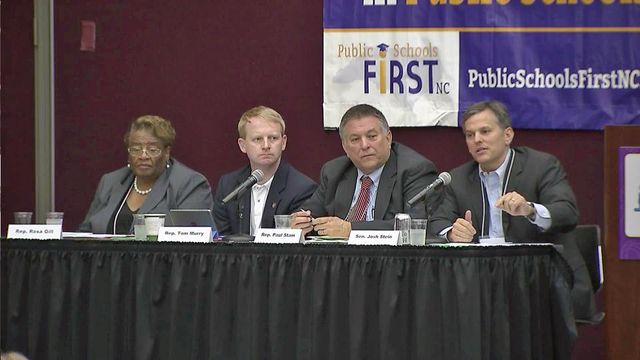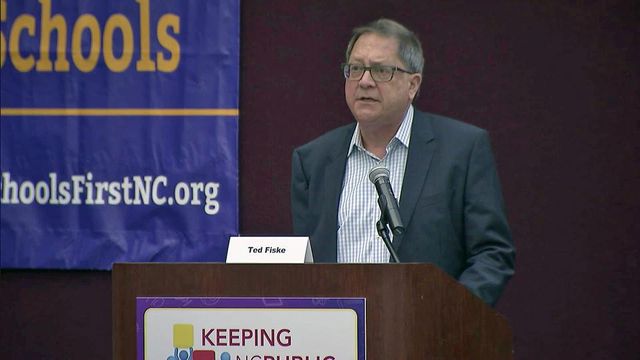Teacher pay, Common Core take center stage during education panel
Teacher compensation and Common Core standards took center stage Saturday morning during a panel discussion at North Carolina State University's McKimmon Center.
Posted — UpdatedState representatives Rosa Gill, D-Wake, Tom Murry, R-Wake, Paul Stam, R-Wake, and Senator Josh Stein, D-Wake, offered a window into some of what the North Carolina General Assembly may tackle during its short session, which begins later this month.
"Teacher compensation is not a new issue," Murry said when describing the challenges his mother faced during a 30-year career in education. "I'm glad we're having the conversation, but it's not a new issue. We will reward teachers this year with compensation increases."
Murry said a good place to start will be with new teachers, those who have spent less than six years on the job.
"We need to focus on those teachers because that's the future as the work force ages," he said. "We need to plant a tree today, and that's what we're trying to do with our early teacher compensation plan."
Stam pointed to the difference between salary and compensation, saying that he supports the state's decision to put substantial funds towards benefits such as health insurance and retirement.
"I read in the News & Observer about this $30,800 figure. That only applies to beginning teachers in school systems with no supplement, which is almost none," Stam said. "What is the compensation for a beginning teacher in Wake County? Well, it's $48,335. I think it is a wise decision that the state has made for decades to put a lot of money into benefits."
Wake schools’ average teacher salary is $45,512 while the national average is $56,383, the district said in April.
Stein was critical of Gov. Pat McCrory's plan to give new teachers pay raises, saying a plan that didn't also give raises to experienced teachers "doesn't really constitute a teacher compensation plan at all."
"Our kids learn because of our teachers. They are the single most important school-related factor in student achievement. Yet teacher morale is as low as any of us can remember," he said. "Their sense of alienation is no surprise given how the state has treated them in recent years."
Stein said he expects the General Assembly to pass a plan in the short session that gives teachers a 1 to 2 percent increase in pay.
"We have to demand a multi-year commitment," he said, citing North Carolina's national ranking of 46th in teacher pay and compensation. "One to 2 percent won't get it done."
As for Common Core, Stein said he expects the legislature to abandon it.
"There is a great deal of misinformation. First, it's not a curriculum. It's a set of standards about what we expect students to know each year," Stein said. "Second, it's not a federal initiative. Third, it's extremely popular with teachers. When you roll out a new program you expect kinks. You work through them."
A student committee on April 24 approved a proposal to move North Carolina away from Common Core.
Although the bill does delete legislative language referencing Common Core standards, it does not take them out of play right away. Rather, the measure would create an Academic Standards Review Commission to develop standards "tailored to the needs of North Carolina's students."
The commission would be part of the state Department of Administration, not the Department of Public Instruction. It would be instructed to finish a first run at revising the standards by 2015, in time for the 2016 legislative session.
The revised standards would go to State Board of Education for approval, but if lawmakers don't agree with the board's position, they could override it and enact new standards themselves.
Saturday's panel discussion was hosted by Public Schools First NC and moderated by Joel Rosch, a senior research scholar at Duke University's Center for Child and Family Policy.
• Credits
Copyright 2024 by Capitol Broadcasting Company. All rights reserved. This material may not be published, broadcast, rewritten or redistributed.






